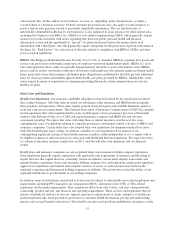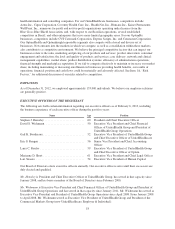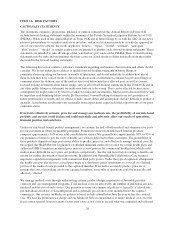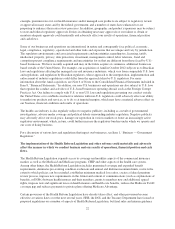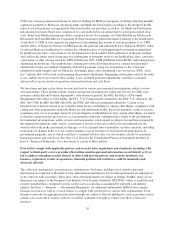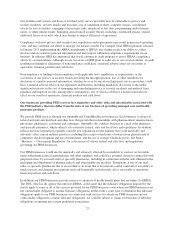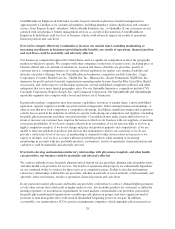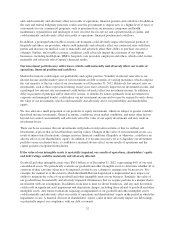United Healthcare 2012 Annual Report Download - page 24
Download and view the complete annual report
Please find page 24 of the 2012 United Healthcare annual report below. You can navigate through the pages in the report by either clicking on the pages listed below, or by using the keyword search tool below to find specific information within the annual report.example, premium rates for our health insurance and/or managed care products are subject to regulatory review
or approval in many states and by the federal government, and a number of states have enhanced (or are
proposing to enhance) their rate review processes. In addition, geographic and product expansions may be subject
to state and federal regulatory approvals. Delays in obtaining necessary approvals or our failure to obtain or
maintain adequate approvals could materially and adversely affect our results of operations, financial position
and cash flows.
Some of our businesses and operations are international in nature and consequently face political, economic,
legal, compliance, regulatory, operational and other risks and exposures that are unique and vary by jurisdiction.
The regulatory environments and associated requirements and uncertainties regarding tax, licensing, tariffs,
intellectual property, privacy, data protection, investment, management control, labor relations, fraud and
corruption present compliance requirements and uncertainties for us that are different from those faced by U.S.-
based businesses. We have recently acquired and may in the future acquire or commence additional businesses
based outside of the United States. For example, our acquisition of Amil in October 2012 subjects us to Brazilian
laws and regulations affecting the managed care and insurance industries, which vary from comparable U.S. laws
and regulations, and regulation by Brazilian regulators, whose approach to the interpretation, implementation and
enforcement of industry regulations could differ from the approach taken by U.S. regulators. For more
information about the Amil acquisition, see Note 6 of Notes to the Consolidated Financial Statements included in
Item 8, “Financial Statements.” In addition, our non-U.S. businesses and operations are also subject to U.S. laws
that regulate the conduct and activities of U.S.-based businesses operating abroad, such as the Foreign Corrupt
Practices Act. Our failure to comply with U.S. or non-U.S. laws and regulations governing our conduct outside
the United States or to establish constructive relations with non-U.S. regulators could adversely affect our ability
to market our products and services, or to do so at targeted margins, which may have a material adverse effect on
our business, financial condition and results of operations.
The health care industry is also regularly subject to negative publicity, including as a result of governmental
investigations, adverse media coverage and political debate surrounding industry regulation. Negative publicity
may adversely affect our stock price, damage our reputation in various markets or foster an increasingly active
regulatory environment, which, in turn, could further increase the regulatory burdens under which we operate and
our costs of doing business.
For a discussion of various laws and regulations that impact our businesses, see Item 1, “Business — Government
Regulation.”
The implementation of the Health Reform Legislation and other reforms could materially and adversely
affect the manner in which we conduct business and our results of operations, financial position and cash
flows.
The Health Reform Legislation expands access to coverage and modifies aspects of the commercial insurance
market, as well as the Medicaid and Medicare programs, CHIP and other aspects of the health care system.
Among other things, the Health Reform Legislation includes guaranteed coverage and expanded benefit
requirements, eliminates pre-existing condition exclusions and annual and lifetime maximum limits, restricts the
extent to which policies can be rescinded, establishes minimum medical loss ratios, creates a federal premium
review process, imposes new requirements on the format and content of communications (such as explanations of
benefits, or EOBs) between health insurers and their members, grants to members new and additional appeal
rights, imposes new and significant taxes on health insurers and health care benefits, reduces the Medicare Part D
coverage gap and reduces payments to private plans offering Medicare Advantage.
Certain provisions of the Health Reform Legislation have already taken effect, and other provisions become
effective at various dates over the next several years. HHS, the DOL and the Treasury Department have issued or
proposed regulations on a number of aspects of Health Reform Legislation, but final rules and interim guidance
22





